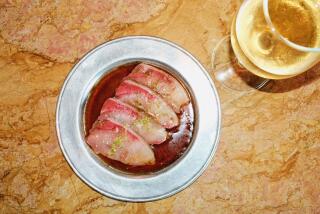Liquor Store to Become Laundry in Riot Cleanup : Business: The owner is the first to take advantage of the city’s financial incentives designed to encourage alcohol-free enterprises in South-Central.
- Share via
Sixteen months after his South-Central Los Angeles liquor store was destroyed by arson during the riots, a Korean-American merchant unveiled plans Monday to convert his business from beer suds to laundry suds.
Daniel Whang, flanked by city and community leaders at a morning news conference, plans to be the first businessman to take advantage of a new city policy providing financial incentives to replace inner-city liquor stores with alcohol-free businesses, such as restaurants and coin-operated laundries.
“Hopefully, this will be a success,” said Whang, who immigrated 11 years ago. “I don’t know yet.”
By agreeing to the conversion, Whang, 42, will receive a $130,000 waiver of city sewage hookup charges for his 60 new washing machines. He also will have his request for a zoning variance, which he filed on Monday, expedited, city officials said.
Like other merchants whose liquor and grocery stores burned during the 1992 riots, Whang was concerned about political snags in his efforts to rebuild his business because of community groups fighting the overabundance of liquor stores in South-Central Los Angeles.
Before the riots, there were about 700 liquor licenses in the 40-square-mile section of the city--more than 10 times the number per square mile in Los Angeles County, according to a mayoral task force. Thus far, only a handful of the 200 stores destroyed by rioting in South-Central Los Angeles have reopened and only a third of 180 Korean-American owned outlets have applied to rebuild, according to the Korean-American Grocers Assn.
Whang’s decision to convert rather than fight was hailed by community leaders as a sound business move and an important contribution to the healing process in Los Angeles.
“I think it’s commendable,” City Councilman Mark Ridley-Thomas said. “He has taken essentially a leap of faith, not out of a sense of charity, but out of a sense of good business. . . . He will risk going into a new line of work so that he can be a responsible citizen.”
After meeting with local residents last week, Whang, who hopes to open the O-Matic self-service laundry at 89th and San Pedro streets in four months, agreed to requests that he hire neighborhood residents and keep his property well lit.
In return, residents promised to help calm any fears Whang might have about taking a financial soaking, said Elizabeth McClellan of the Community Coalition for Substance Abuse Prevention and Treatment.
“One of the most important factors in the rebuilding and healing of Los Angeles is that the community and the merchants would have some involvement in this rebuild issue,” McClellan said at the news conference. “We’re going to watch out for him and make sure that this is a place where anybody who wants to wash can come.”
At least one area entrepreneur opposes Whang’s plan--the operator of the only other coin-operated laundry nearby. “We already have enough liquor stores,” said Andrew Miller, an African-American who owns A & H Friendly Coin-Op Laundry eight blocks to the south. “But we don’t need another laundry, either.”
But several speakers and neighborhood residents put a different spin on the issue, saying there is ample room for competition. Besides, McClellan said, “We don’t want to give the idea we’re going to infest the neighborhood with Laundromats either.”
By all accounts, Whang, who bought Ma’s Liquor in 1986, has maintained a good relationship with his customers and neighbors. Some, such as Sylvester Watson, who owns a car wash on an adjoining lot, say they would have preferred that he reopen a grocery, with or without liquor.
“He was so good in letting poor people have credit till their checks came in,” Watson said.
But others contend that even as well-meaning as Whang had been, the type of business he ran tended to attract loitering, drinking and prostitution.
“It was like a magnet for bad behavior,” said neighborhood resident John Flowers, 29.
Ma’s Liquor went up in flames on the first night of rioting after the not-guilty verdicts were announced in the first trial of four LAPD officers accused of beating Rodney G. King.
At first, Whang moved forward with plans to rebuild. But faced with a fight, he decided to be the first to take advantage of a business conversion program sponsored by a coalition of community organizations, including the Community Coalition, the Asian-Pacific Planning Council, the Korean Youth and Community Center and Asian Pacific Americans for a New L.A. The sewer hookup waiver program, approved last month by the City Council for a two-year period, provided the financial incentive.
Whang is seeking loans for his $750,000 business plan from the U.S. Small Business Administration and from a Rebuild L.A. loan fund, which soon will begin approving financing of $25,000 to $250,000 for small businesses.
More to Read
Sign up for Essential California
The most important California stories and recommendations in your inbox every morning.
You may occasionally receive promotional content from the Los Angeles Times.










